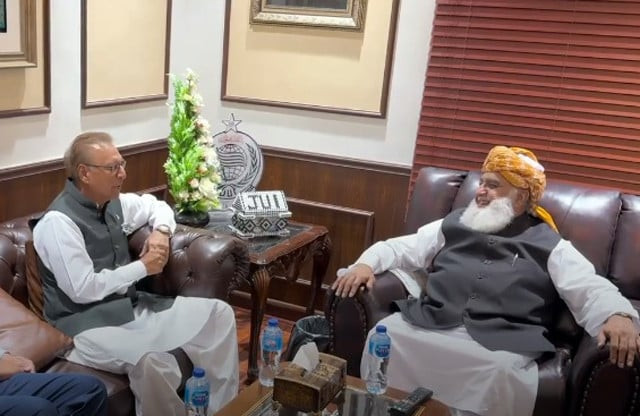PTI’s Arif Alvi meets Fazlur Rehman to discuss proposed constitutional amendments
Ruling PML-N-led coalition faces resistance in pushing through its secret constitutional amendment package

Former president and senior Pakistan Tehreek-e-Insaf (PTI) leader Arif Alvi met with JUI-F chief Maulana Fazlur Rehman at his residence in Islamabad on Tuesday to discuss the government's proposed constitutional amendments, a move seen as part of the broader efforts to break the deadlock over crucial political reforms.
The meeting was attended by key figures, including PTI Secretary General Salman Akram Raja, Maulana Attaul Haq Darvesh, Maulana Asad Mahmood, Akhunzada Hussain, and Abdul Jalil Jan.
According to sources, the discussions focused on reviewing the proposed amendments aimed at reforming the constitutional framework. Alvi extended his congratulations to Fazlur Rehman for presenting his stance on the amendments during earlier parliamentary discussions.
The meeting came at a critical time, as the ruling PML-N-led coalition faces resistance in pushing through its secret constitutional amendment package. Fazlur Rehman, a key political ally in the past, has emerged as a significant obstacle, refusing to back the government's proposed amendments despite intense lobbying.
Sources disclosed that PTI founder Imran Khan had given Alvi a special task, potentially signalling that the PTI is closely monitoring developments and may seek to influence the outcome.
The constitutional amendments, which have been shrouded in secrecy, aim to address a range of political and legal issues, including reforms to the judiciary and the process of appointments in higher courts. The amendments also seek to adjust the balance of power within the federal system.
Govt's setback and JUI-F's stance
The ruling coalition, led by PML-N, suffered a setback on Monday when its efforts to table the amendment bill collapsed after Fazlur Rehman refused to support the government's package. Despite marathon parliamentary sessions over the weekend, including back-to-back sittings of the National Assembly and Senate, the government failed to secure the required votes to pass the bill.
Fazlur Rehman has remained firm in his refusal, citing concerns over the secretive manner in which the government has handled the process. His party, JUI-F, holds crucial votes in both the National Assembly and the Senate, making his support essential for the coalition to pass the amendments. Without JUI-F’s backing, the government is unlikely to secure the two-thirds majority required to pass a constitutional amendment.
Lobbying efforts and cabinet delays
The government had pulled out all the stops to win Fazlur Rehman over, with senior ministers visiting his residence multiple times to negotiate a deal. However, their efforts have so far been in vain, with Rehman holding firm to his position. The federal cabinet, which was expected to greenlight the bill, has been unable to convene due to the ongoing deadlock. The cabinet's inability to hold a session has further delayed the presentation of the bill in parliament.
Adding to the confusion, Law Minister Azam Nazeer Tarar, who previously denied the existence of the bill, later admitted that a draft had been prepared but not yet presented to the cabinet. This contradiction has raised questions about the government’s handling of the process, with opposition parties accusing the ruling coalition of trying to push the bill through without proper debate or consultation.
Opposition criticism
PTI leader Asad Qaiser has been vocal in his criticism of the government's approach, accusing it of trying to pass the amendments "by hook or by crook" without transparency. He questioned why the government was attempting to rush the bill through without allowing adequate discussion, particularly as the draft has not been finalised. Qaiser also alleged that PTI lawmakers were being pressured to support the bill, claiming they were being "abducted" and held at Punjab House to ensure the coalition achieved the necessary majority.
Amendment highlights
The proposed amendments include key changes to the Constitution, such as the establishment of a Federal Constitutional Court (FSC), parallel to the Supreme Court, to oversee constitutional matters. The amendments also propose reforms to Article 63A, which would change how votes by defecting lawmakers are counted, as well as adjustments to the judicial appointment process.
Defence Minister Khawaja Asif defended the amendments, stating that they were aimed at addressing constitutional imbalances and reducing the backlog of cases in the judiciary. He argued that the bill was in line with the Charter of Democracy (COD) signed by PML-N and PPP, which calls for broader reforms to strengthen democratic institutions.
The government has vowed to reintroduce the bill once a consensus is reached, acknowledging that the lack of agreement with JUI-F has delayed the process. However, with Fazlur Rehman showing no signs of backing down, it remains unclear when the bill will be presented in parliament.
Ongoing negotiations
Meanwhile, PPP Chairman Bilawal Bhutto-Zardari has also met with Fazlur Rehman to discuss the proposed amendments, in an attempt to mediate between the ruling coalition and the JUI-F. However, the political stalemate continues, and the hurriedly convened parliamentary sessions ended without achieving their objective.
As the government struggles to bring its key allies on board, the delay in passing the amendments has prolonged the political uncertainty. Observers note that the government's secretive push for the amendments, and its failure to achieve consensus, has fuelled criticism from both opposition parties and within its own ranks.
Despite the setbacks, the ruling coalition remains determined to push forward with its legislative agenda, with plans to present the amendments again in the next session of the National Assembly. However, without Fazlur Rehman’s support, the path to passing the bill remains fraught with challenges.



















COMMENTS
Comments are moderated and generally will be posted if they are on-topic and not abusive.
For more information, please see our Comments FAQ